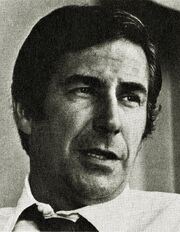
Maurice Robert "Mike" Gravel (13 May 1930-26 June 2021) was a Democratic US Senator from Alaska from 3 January 1969 to 3 January 1981, succeeding Ernest Gruening and preceding Frank Murkowski.
Biography[]
Maurice Robert Gravel was born in Springfield, Massachusetts in 1930, one of five children of French-Canadian immigrant parents. He served in the US Army in West Germany at the time of the Korean War, and he lived in New York City as a young man before deciding to become a "pioneer" in far-off Alaska in 1956; at the time, Alaska had a voting age of 19, lower than most other states' voting age, which, at the time, was 21 years. Gravel became involved in the Alaska Democratic Party, and, while his runs for office in the late 1950s were unsuccessful, he went on to serve in the State House from 1963 to 1967, representing Anchorage; he also became a property developer. In 1968, Gravel defeated the 81-year-old incumbent US Senator Ernest Gruening in the Democratic primary for the US Senate by a mere 2,000 votes; Gravel kept silent about his views on the Vietnam War to give voters the impression that he stood to the right of the anti-war Gruening on the political spectrum, when, in fact, Gravel was to his left. Gravel went on to win the Senate race with 45% of the vote to the Republican Elmer E. Rasmuson's 37% and the write-in candidate Gruening's 18%. Gravel became known as an independent-minded "loose cannon" in the Senate, siding with the Southern Democrats to support retaining the filibuster, while opposing nuclearization, criticizing the United States' foreign policy in Southeast Asia, supporting the normalization of relations with China, supporting a guaranteed minimum income of $6,300 a year ($42,000 in 2019), supporting the reduction of US troops overseas by 200,000 in a failed 1975 bill, survived a sex scandal involving an affair with Congressional aide Elizabeth Ray in an alleged "sex-for-vote" deal (he later confessed to having had an extramarital affair with Ray, while he maintained that it was not in exchange for a political favor), supported Israel during the Arab-Israeli conflict, supported the construction of the Trans-Alaska pipeline, and supported maritime conservation. In 1980, he lost the Democratic primary to Clark Gruening while seeking re-election to the Senate, as he had never establihsed a firm voter base, and he was also not keen on hunting or fishing, which led to a cultural divide between Gravel and his constituents. Having lost both his career and his marriage by December 1980 (his wife won all of Gravel's Senate pension income as part of their divorce), Gravel became a real estate developer, but he returned to politics in 1989 as an activist. He supported a second Constitutional Convention to bring about direct democracy, and he remarried and moved to Arlington, Virginia, before moving to Burlingame, California in 2010. Gravel attempted to run for President in 2008 as both a Democrat and a Libertarian, and in 2020 as a Democrat, although he lost both primary bids; in 2020, he dropped out of the primary after just four months and endorsed both Tulsi Gabbard and Bernie Sanders. He proceeded to establish the Gravel Institute as a progressive think tank, and he died in 2021 at the age of 91. The New York Times remembered him as "an unabashed attention-getter", while The Washington Post remembered him for his "quixotic campaigns for the presidency".
